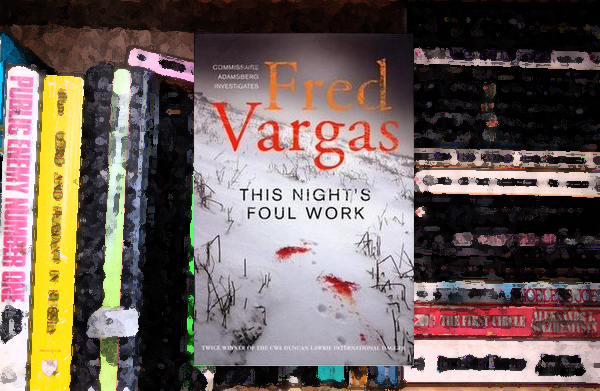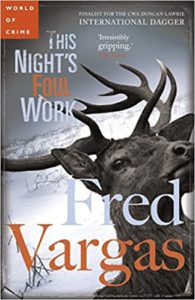Home »

Fred Vargas is a Houdini of words
Book Review
By Derryll White
Vargas, Fred (2006). This Night’s Foul Work.
“In affairs of the heart, it is better to regret things done than to regret things left undone.”
-Fred Vargas
Fred Vargas is always a delight, perhaps because she breaks so many rules. The story begins with a shade, exposed by an old man who has lost an arm but still scratches the spider bite that cost him the loss, more than half a century later. That gives the shade some context.
 The story shifts to the works of Jean Racine, a 17th-century French dramatist who was a master of the dodecasyllabic 12-syllable French alexandrine. Vargas dwells lightly on this, on Racine’s ability to be an antidote to haste for Lieutenant Veyrenc, Commissaire Adamsberg’s foil from the valley next to his birthplace. Then Camille, the itinerant love interest of Commissaire Adamsberg and the mother of his child, drifts in, a bit of a loving shade herself (although not ethereal).
The story shifts to the works of Jean Racine, a 17th-century French dramatist who was a master of the dodecasyllabic 12-syllable French alexandrine. Vargas dwells lightly on this, on Racine’s ability to be an antidote to haste for Lieutenant Veyrenc, Commissaire Adamsberg’s foil from the valley next to his birthplace. Then Camille, the itinerant love interest of Commissaire Adamsberg and the mother of his child, drifts in, a bit of a loving shade herself (although not ethereal).
Meanwhile Adamsberg constantly meanders in his mind and body, trying to pick up the pebbles of clarity that heaven places in his path. There is no one in this genre that has the mystic connection to the world (and perhaps other worlds) that Jean-Baptiste Adamsberg has. Fred Vargas always takes the reader’s mind to strange places.
In fact, Vargas is very much about place. She recognizes the roots of small communities, what ties people from separate regions together. She also sees the regional differences, say between those from the Pyrenees and those from Normandy. With care and attention she makes those differences work and enrich the story.
This is a very adept work, reaching back to a far-away time to bring forward myth and belief still relevant today. Vargas embraces the mystical and makes it tangible. She is a Houdini of words.
********
Excerpts from the novel:
 ADAMSBERG – He looked up at the statue of Joan of Arc, who was bearing the assault of icy hail without flinching. He felt heartily sorry for Joan of Arc; he would have hated to hear voices telling him to do this and that. He already had enough trouble obeying his own instructions, or indeed even identifying them, and would have seriously objected to orders coming from celestial voices. Voices like Joan’s would have taken him into the lion’s den after a brief and glorious epic struggle, since that kind of story always ends in tears.
ADAMSBERG – He looked up at the statue of Joan of Arc, who was bearing the assault of icy hail without flinching. He felt heartily sorry for Joan of Arc; he would have hated to hear voices telling him to do this and that. He already had enough trouble obeying his own instructions, or indeed even identifying them, and would have seriously objected to orders coming from celestial voices. Voices like Joan’s would have taken him into the lion’s den after a brief and glorious epic struggle, since that kind of story always ends in tears.
LOVE – “There’s knowing about women and knowing about love, and it’s not the same thing. Specially with women.”
COMMANDANT DANGLARD – When Danglard was in a bad way, the Unsolved Question of the infinite cosmos returned to plague him, as well as the fact that the sun would explode in four billion years, and that humanity was but a miserable and desperate chance occurrence on a piece of matter whirling through space.
WOMEN – When women went off the rails, Adamsberg said, the world seemed to teeter on its axis. In fact, he had confided to Danglard as they walked up the path, men only allow themselves to kill each other because women don’t, but when women cross the red line, the universe tilts.
 – Derryll White once wrote books but now chooses to read and write about them. When not reading he writes history for the web at www.basininstitute.org.
– Derryll White once wrote books but now chooses to read and write about them. When not reading he writes history for the web at www.basininstitute.org.







